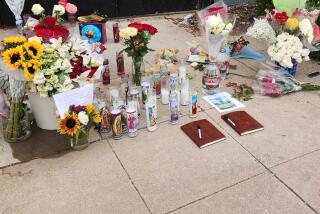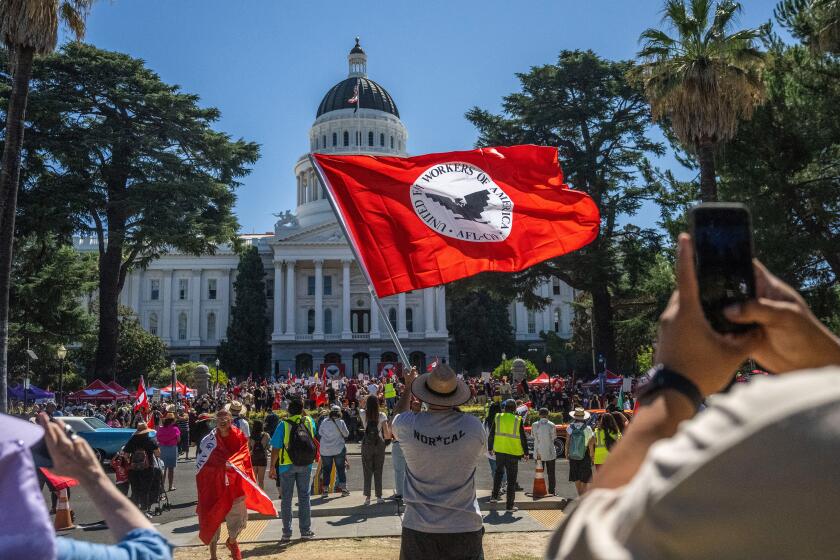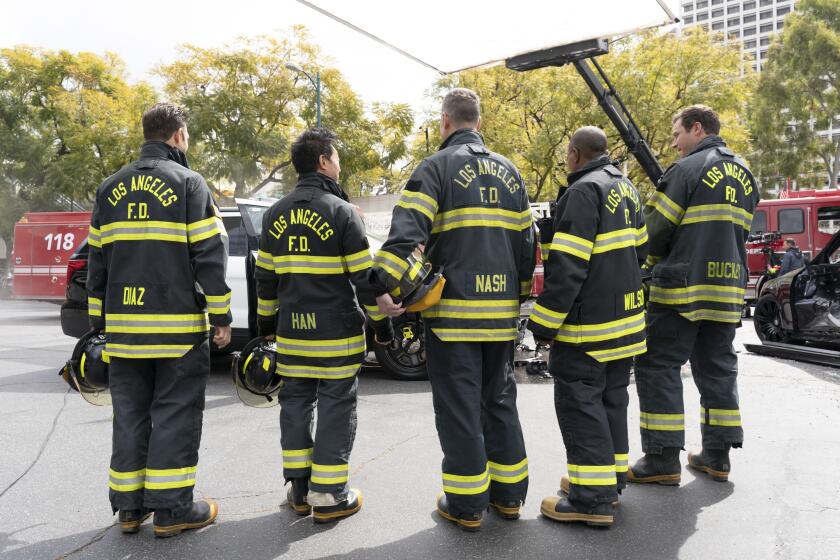Sale of Racist Books Angers Yaroslavsky : Anti-Semitism: A vendor offered the two books during last month’s African Marketplace. The councilman wants to prevent or discourage the sale of such offensive materials at publicly funded events.
In a sharply worded letter to the head of the city’s Cultural Affairs Department, City Councilman Zev Yaroslavsky criticized the sale of two anti-Semitic books by a vendor at last month’s city-sponsored African Marketplace.
Yaroslavsky’s two-page letter asked Adolfo Nodal, cultural affairs general manager, to come up with ways to prevent or discourage the future sale of such offensive materials at publicly funded events.
The books, “The International Jew: The World’s Foremost Problem” by the late auto maker Henry Ford Sr. and “The Protocols of the Elders of Zion,” which originated out of czarist Russia, have been widely discredited for portraying Jews as the masterminds behind a sinister plot to take over the world. Adolf Hitler used the books to advance his own racist theories.
“The sale of these books at a city cultural event, in support of which the taxpayers have allocated $43,000, is an affront not only to the Jewish community but to all who abhor racism and treasure tolerance,” wrote Yaroslavsky in a Sept. 19 letter to Nodal. Copies of the letter were sent to seven Jewish organizations, Mayor Tom Bradley, the city Human Relations Commission and the City Council.
Both Nodal and members of The Friends of the William Grant Still Art Center, the volunteer organizers of the city’s African Marketplace and Cultural Faire, agree that the books are repugnant. But they voiced doubt about whether a ban on selling them at city-sponsored festivals would work.
“We are also very concerned about the First Amendment issues that this situation brings up, and the need to allow for freedom of expression no matter how scurrilous and misguided it may be,” Nodal wrote in response.
“It is true these are disreputable, ugly books, and we don’t condone the books in any way, but it would be a basic violation of freedom of expression to say that the books could not be sold,” said Muriel Crowe, a member of the William Grant Still Art Center.
Yaroslavsky wrote the letter after receiving three complaints last month from constituents that the offending books were being sold by Eso Won Bookstore, a Los Angeles store that specializes in books for and about African Americans. The two publications were among about 500 books that Eso Won--one of 20 bookstore vendors at the event--had on display.
“We don’t understand what the problem is. If there was something I saw and didn’t like, I wouldn’t buy it,” said James Fugate, a co-owner of Eso Won. “I have never read the book, but we keep it in stock because we have received so many requests for it. Besides, the books are not illegal. They are even in the library.”
Yaroslavsky said the bookstore has a right to sell whatever it wants, but not at the city’s expense. “The question is, are they serving a market or trying to create a market,” he said. “I doubt there is much interest in that book in this country.”
In just five years the African Marketplace has grown from a small street fair with two vendors outside the William Grant Still Center into a major cultural event celebrating what promotional materials called “the African Diaspora, and the influences of African culture.” At this year’s African Marketplace, more than 150,000 people turned out to see about 2,000 performers and shop among the more than 200 vendors. Each vendor paid a $450 fee to the city for the right to display goods and serve food over two weekends, from Aug. 25 to Sept. 3, at Rancho Cienega Park.
“It has taken a lot of hard work by a lot of dedicated people to make the African Marketplace a fixture in Los Angeles,” said James V. Burks, the director of the city’s performing arts division, who founded the marketplace. “We hope that one day it will grow into a permanent fixture in Los Angeles like Little Tokyo, Chinatown or the Farmers Market.”
Organizers of the marketplace said they have never allowed people to use the festival as a soapbox to express offensive political beliefs.
“That is not what we are trying to do,” said Clinton Simmons, another member of the Friends of the William Grant Still Art Center. He complained that Yaroslavsky might have resolved the issue without tainting the festival with the charge of anti-Semitism.
“He is trying to discredit the African Marketplace by linking it with anti-Semitism,” Simmons said. “If he had a problem with the way the marketplace was being run, why didn’t he come to us instead of sending it out to all those organizations?”
Yaroslavsky said he sent copies of his letters to Jewish organizations because they are interested in the book and because several groups had already been contacted about the sale of the book at the festival.
“This is not an attack on the African Marketplace,” Yaroslavsky said. “It’s an attack on a book that has no business being given credibility and sanction by the city of Los Angeles. There are a lot of people who feel very strongly about this book and I’m one. My parents were victimized in pogroms by the people who believed in the crap that is spewed in ‘The Protocols of the Elders of Zion.’ ”
Nodal said he was shocked and saddened after reading parts of the two books, which one of his staff had checked out of the Los Angeles Public Library. “It is devastating to witness firsthand the hatred, ignorance and false premises that these books represent,” he wrote Yaroslavsky.
However, as an alternative to banning the book outright, Nodal said he is considering a number of recommendations, including warnings that the city may not endorse all views expressed at the festival. He said he is also considering setting up committees of vendors to regulate themselves. Another option, he added, is to provide the opportunity for rebuttal for those groups that have been offended.
Nodal said he plans to meet with Yaroslavsky this week to discuss these and other recommendations.
Yaroslavsky said the issues involved in the sale of anti-Semitic books are of concern not just to Jews.
“If the Anti-Defamation League (of B’nai B’rith) had been selling books by William Shockley (whose theories that blacks are intellectually inferior have angered many) at a festival, the issue would have been raised and rightfully so,” he said.
Though some have expressed fear that Yaroslavsky’s letter was a veiled threat to cut funding for the marketplace, the councilman said that was never his intention.
“I have never suggested the city use its financial leverage in this area,” he said. “But others may or will. Some people in Los Angeles would raise concerns. I would rather do it through education and understanding. . . . It is important that these boils are lanced early and not allowed to get out of control.”
The belief that city funds should not be used at events where hate literature is sold was supported by both the Simon Wiesenthal Center and the Anti-Defamation League of B’nai B’rith.
“It is inappropriate to disseminate hate material at any event where public funds are used,” said David Lehrer, director of the Anti-Defamation League. “People still have their First Amendment rights, but not when tax funds are making it possible.”
Rabbi Abraham Cooper, associate dean of the Simon Wiesenthal Center, said “The Protocols of the Elders of Zion” and “The International Jew” are “two leading books in the paranoia of hate.” He said that in recent years the books have been experiencing a resurgence of popularity, particularly in the Arab world.
“These books have an amazing shelf life,” he said. “On a recent trip to Japan I saw ‘The Protocols of Zion’ in two bookstores. . . . They are the perfect kind of book for people who don’t want to be confused by the facts.”
“The Protocols of the Elders of Zion” claims to be the minutes of secret meetings of a Jewish conclave in the last years of the 19th Century. It has been described by anti-Semites as proof of a Jewish plot to take over world governments, banking and other institutions. The book has long been discredited, but it continues to surface in the hands of those who claim it is fact.
Auto magnate Henry Ford published a compilation of anti-Semitic articles that had been printed in his magazine, “The Dearborn Independent,” between 1920 and 1922. The book, “The International Jew: The World’s Foremost Problem,” outlines what he alleged was “Jewish control” over all aspects of life in the United States, including government, banking and labor. Ford later repudiated the book.
As a measure of how controversial the books are, neither includes the name of the publisher or distributor. James Fugate, the owner of Eso Won Bookstore, would not identify his supplier.
Most of the books in the Eso Won Bookstore directly relate to African-American culture, history, arts and thought, with a large section devoted to Islamic philosophy. The store also has a small section on Jews and Israel.
“Blacks have always been interested in Jews,” Fugate said. “They are perceived as a successful minority in this country that has done well.” The section includes such titles as “Israel and South Africa,” by Donald Will and Sheila Ryan and published by Africa World Press, and “Empire of Their Own . . . How the Jews Invented Hollywood,” by Neal Gabler and published by Doubleday Publishing.
Eso Won is no stranger to controversy. Most recently, it has received numerous complaints about Shahazad Ali’s book, “The Blackman’s Guide to Understanding the Blackwoman.” That book, in which the author advises the black man to “soundly slap” the black woman if she ignores his authority and superiority, has been burned, banned and boycotted around the country. Although the Eso Won owners decided to stock the book and to sponsor a book party for the author, they say they don’t necessarily agree with her point of view.
More to Read
Start your day right
Sign up for Essential California for news, features and recommendations from the L.A. Times and beyond in your inbox six days a week.
You may occasionally receive promotional content from the Los Angeles Times.






